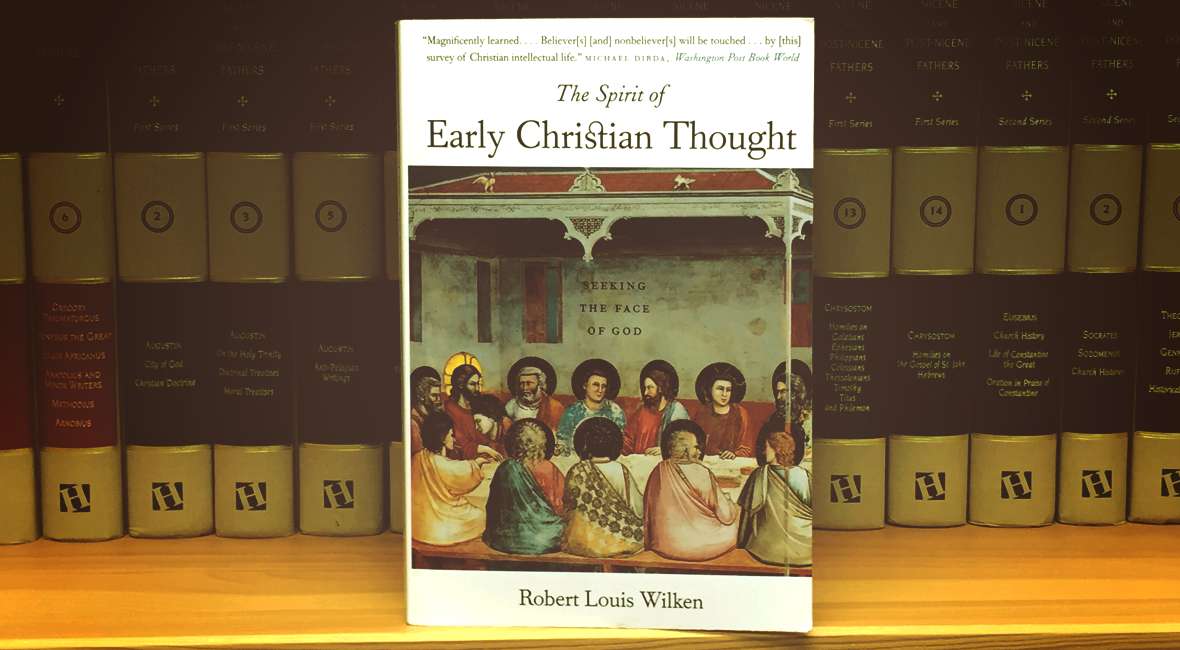The Spirit of Early Christian Thought by Robert Louis Wilken

What the Book is About
The Spirit of Early Christian Thought is a survey of the greatest thinkers of the early church on a broad range of subjects. Each chapter is dedicated to a single topic, such as the Trinity, virtue, politics, or apologetics. Wilken artfully weaves thoughts from at least two primary writers in each chapter, diving to the depths of the issue, offering the wisdom of the ancients to a modern audience. Wilken is careful not to rely on the same thinker over and over, so the audience is treated to a wide range of authors, including Justin Martyr, Iranaeus, Athanasius, Basil of Caesarea, and others. He admits, however, that there were four giants, so to speak, to which he returned more often than the rest: “Origen in the third century, Gregory of Nysa in the fourth, Augustine in the fifth, and Maximus the Confessor in the seventh.” (p. xix) Any student interested in learning from the great masters of the Church would do well to start with these four.
As noted above, Wilken’s approach is to tackle one issue in each chapter, and to do so under the guidance of two ancient writers. While he does not typically quote any author at length, he pieces together their thoughts and gives them flesh through his own prose. The reader may be left with the hunger to hear more directly from Origen or Augustine, but the effect is to give the audience the best of their thoughts in modern formulations. A typical example can be taken from the first chapter, which dealt with the Christian concern of apologetics.
In taking this approach, the reader must trust that Wilken has done his homework, and is faithfully presenting the thoughts of each author. While I often found myself longing for lengthier quotations, I came to conclude that Wilken’s approach was best. Nearly two thousand years separate my mind from the ancient author’s words. In such a sweeping survey, it is helpful to have a learned mediator bridge the gap between the style of their writing and the form of prose which best suits modern readers.
What I Learned
The Spirit of Early Christian Thought baptizes its readers in the thoughts of the church’s first, and arguably greatest, authors, defenders, theologians, and pastors. I feel as though I have been immersed in a new way of thinking that is, of course, a rather old way of thinking. But it is wise. The authors Wilken surveys in this book were great thinkers, as smart as anybody the Church, or the whole world for that matter, has ever produced. Their words come down to us today at just the right time, as the Western world is turning back to the ways of Rome and Greece.
Because of current events, the chapter that stood out to me most was the one on politics and the place of Christians in the commonwealth. Titled Happy the People Whose God Is the Lord, Wilken interacts primarily with Augustine’s great work, The City of God. Soaking in Augustine’s thought was an experience of intellectual refreshment. Wilken writes, “‘A people,’ he [Augustine] writes, ‘is the association of a multitude of rational beings united by a common agreement on the objects of their love.’ The question, then, to be asked of any political community is, What does it love? …A person is what one loves, and what a community loves makes it the kind of community it is.” (p. 206) Then, channelling a prophetic Augustine, he writes:
The American socio-political climate certainly bears this out. We love ourselves more than we love God, and the only thing that binds us together as a nation is our incessant love of self. No wonder we have an epidemic of depression while leading the world in self-esteem. We love ourselves, and are empty. “A society that has no place for God will disintegrate into an amoral aggregate of competing, self-aggrandizing interests that are destructive of the commonweal. In the end it will be enveloped in darkness.” (p. 208)
What, then, is the place of the church? “The church is not an instrument to achieve other ends than fellowship with God. It serves society by being unapologetically itself and by bearing witness to the justice that alone makes human community possible, the justice due God.” (p. 208) In the Church there is life with God, because the Church is the community that is bound by its love of God. Christians do not belong to a community whose ends, whose telos, lie within the confines of this world. “Christians…belong to a community of hope whose end lay outside of history.” (p. 197) This is why we often say that the Church is the hope of the world. So the Church must go on being the Church, refusing to accommodate the world or be conformed to its ways, but always remaining faithful to Christ.
My Recommendation
I have committed myself to reading the Early Church Fathers in 2016. While I hesitated to read a modern work, The Spirit of Early Christian Thought has helped me to soak in the formative thinking of these great men. Wilken does an excellent job of allowing the spirit of early Christian thought come through in his modern prose. He is faithful to the authors he is presenting.
Whether you are interested in what the early Church authors had to say or not, this is an excellent book and I highly recommend it. If you are like me and believe that the wisdom of the past greatly exceeds the wisdom of the present, this book will be a tutor for your mind and a nurse for your soul. Take it and read.

